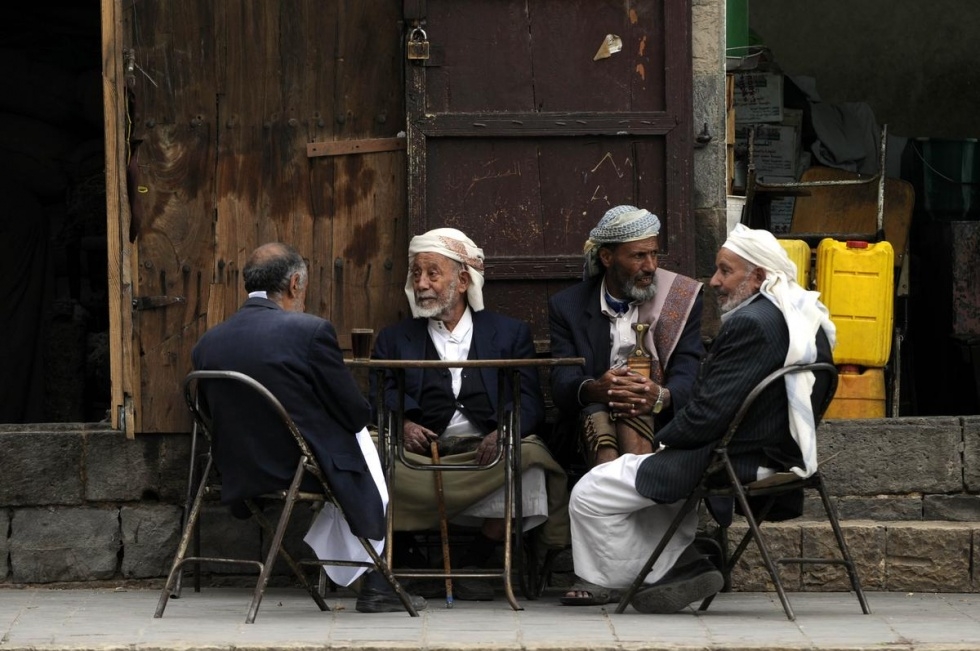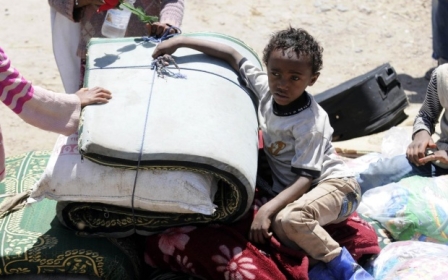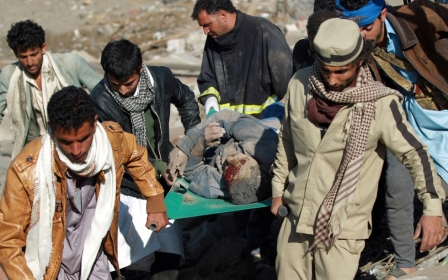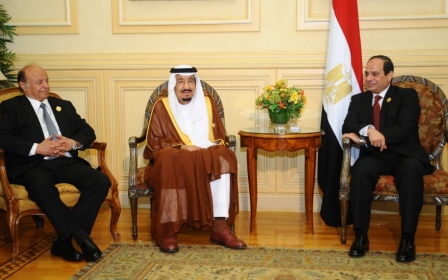Saudi Arabia pledge further Yemen strikes to stop Houthi 'advance'

Saudi Arabia has warned that Houthi militiamen have been mobilising towards their border as the kingdom prepares to continue its bombing campaign in Yemen.
“These operations shall continue the next few days to prevent the advance of Houthi forces,” a Saudi military spokesman told reporters on Saturday.
He said the Saudi-led anti-Houthi coalition was taking all precautions to avoid civilian casualties in its campaign against the Iran-backed Shiite movement.
However, he claimed that Houthis had set up “right in the middle of civilian populations” forcing Saudi jets to engage in “collateral damage.”
He added that Riyadh had “removed 86 people of different nationalities” including diplomats, from the country with the help of the Saudi navy.
The update came on the same day as the Arab League met at the Sharm el-Sheikh resort in Egypt to discuss regional issues.
Speaking at the summit, Yemen's President Abd Rabbuh Mansour Hadi condemned the Houthis as “stooges of Iran” and called for Yemenis to continue to agitate against them.
Hadi called on all Yemenis to “continue to back and support the legitimate authority of Yemen” and maintain “peaceful demonstrations”.
He thanked the “honorouble men” who had enabled him to escape from the southern Yemeni city of Aden - where he was holed up after fleeing the capital Sanaa - and travel briefly to neighbouring Oman before moving onto Saudi Arabia.
"I call for this operation to continue until this gang surrenders and withdraws from all locations it has occupied in every province," Hadi told the gathering.
Hadi's foreign minister told reporters that the embattled president travelled with Saudi King Salman to Riyadh on Saturday and would not be returning to Yemen until the situation "settles".
Footage released on YouTube appeared to show people ransacking Hadi's residence in Aden.
His speech comes as local sources in Yemen report that 61 people have so far been killed and 200 others wounded in three days of fighting between the Saudi-led coalition and the Houthis.
"It was an intense night of bombing and the windows shook," said one aid worker on Saturday, speaking to AFP.
"People want to leave but there are no flights out of Yemen," she said.
Human Rights Watch on Saturday criticised the bombing campaign warning to avoid civilian causualties.
“Both the Saudi-led forces and the Houthis need to do everything they can to protect civilians from attack,” said Joe Stork, deputy Middle East and North Africa director.
“Reports of air strikes and anti-aircraft weapons in heavily populated areas raise serious concerns that not enough is being done to ensure their safety.”
They added that Saudi Arabia should avoid the use of cluster bombs – which it has used in previous conflicts – so as to minimise collateral damage.
'Spreading its ailment'
Saudi Arabia, with political backing from the US, arranged the coalition of Sunni Arab states on Wednesday after concern over the Houthis advance on Aden.
The Saudis, who with 100 fighter jets make up the largest contingent in the anti-Houthi coalition, have been increasingly worried about the possibility of an Iranian-backed power being established on its southern border.
Iran has publicly supported the Houthis and on Thursday condemned the airstrikes as a violation of Yemen's sovereignty.
"Any military action against an independent country is wrong and will only result in a deepening crisis and more deaths among innocents," Foreign Minister Mohammad Javad Zarif said.
Other Arab leaders at the Sharm al-Sheikh summit also condemned what they percieve as Iranian expansion in the region with Egyptian President Abdel Fattah al-Sisi referring to it "spreading its ailment in the body" without mentioning Iran by name.
Reuters quoted unnamed US officials confirming that members of Iran's Islamic Revolutionary Guard Corps (IRGC) were in Yemen training Houthis.
On Saturday, Hassan Nasrallah, the secretary-general of Lebanese Shiite movement Hezbollah – who also receives political and economic support from Iran – condemned the bombings in Yemen as “illegal.”
“The outcome of this war is clear: Saudi Arabia will be defeated and the Yemeni people will have an undeniable victory,” Nasrallah said in a televised speech.
“Saudi leaders have one last chance before they are defeated and humiliated, and that is to behave with the Yemenis like brothers and to begin a dialogue while the door is still open.”
'Clear guidelines'
Speaking in Sharm al-Sheikh on Saturday, UN secretary-general Ban Ki-Moon stressed the need for dialogue and negotiations and called for “clear guidelines to peacefully resolve the crisis”.
Yemen has been in a state of unrest since 2011 when demonstrations began against the autocratic rule of former President Ali Abdulleh Saleh, eventually leading to him stepping down.
Though Hadi was installed shortly afterwards in a one-candidate election, with the purpose of beginning negotiations towards the establishment of a democracy within the country, the power vacuum allowed the Houthi movement to expand across the country.
They took control of the capital Sanaa in September 2014, which, after failed attempts to negotiate a final settlement between different political actors in the country, eventually led to Hadi's resignation and his flight to Aden.
Another concern for the international community has been the growth of al-Qaeda in the Arabian Peninsula (AQAP) and, in recent weeks, the Islamic State group, which are alleged to have established a presence in Yemen following the deadly bombing of a mosque in Sanaa last week.
While both groups are hostile to the Houthis and Saudi Arabia (as well as each other) they have yet to establish a clear position on the Saudi-led airstrikes.
Middle East Eye propose une couverture et une analyse indépendantes et incomparables du Moyen-Orient, de l’Afrique du Nord et d’autres régions du monde. Pour en savoir plus sur la reprise de ce contenu et les frais qui s’appliquent, veuillez remplir ce formulaire [en anglais]. Pour en savoir plus sur MEE, cliquez ici [en anglais].




